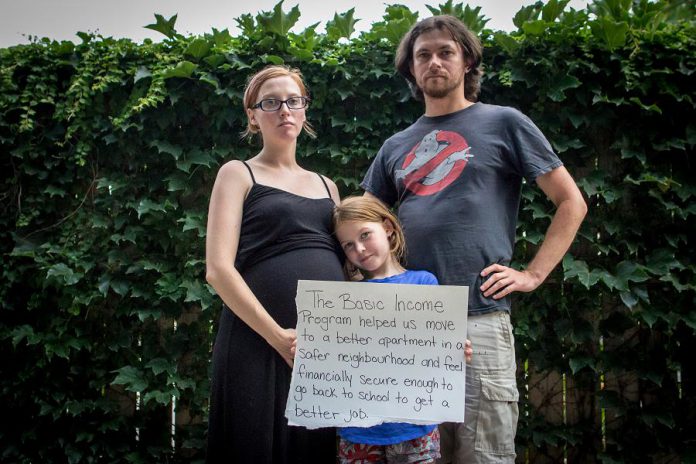
The Haliburton, Kawartha, Pine Ridge (HKPR) District Health Unit, via its governing board of health, has joined a growing call for the transformation of the COVID-19 related Canada Emergency Response Benefit (CERB) into a guaranteed basic monthly income payment for all those who qualify.
At their meeting Thursday (June 18), board members unanimously endorsed a recommendation from their colleagues overseeing the Simcoe Muskoka District Health Unit calling for the implementation of a guaranteed basic monthly program moving forward.
With the COVID-19 pandemic recovery ongoing, the federal government announced on Tuesday (June 16) that it would be extending the CERB program for eight more weeks, providing $2,000 monthly for those who apply and qualify.
In a May 20th letter — addressed to Prime Minister Justin Trudeau, Deputy Prime Minister Chrystia Freeland, and Finance Minster Bill Morneau, and circulated to other Ontario boards of health — Simcoe Muskoka board of health chair Anita Dubeau wrote now “is an opportune time for the federal government to take action to evolve CERB into a basic income,” adding, “CERB has helped demonstrate the logical feasibility of delivering a basic income.”
“We strongly recommend your government take swift and immediate action on the evolution of the CERB benefit into legislation for a basic income as an effective long-term response to the problems of income insecurity, persistent poverty and household food insecurity,” concluded Dubeau.
The HKPR District Health Unit board of health endorsement is significant in light of the fact that Lindsay was one of just four Ontario communities involved in the Ontario Basic Income Pilot Project undertaken in 2018 under Ontario’s former Liberal government.
The planned three-year project, undertaken as a result of recommendations made by former senator Hugh Segal following public consultation, saw a basic income provided to 4,000 people, a portion of whom resided in Lindsay. Single participants received up to $16,989 annually while couples received up to $24,027. If participants were being paid a salary or wages, or drawing other benefits, that amounted was adjusted downwards based on a dollar-for-dollar formula.
However, 10 months after the first distribution of payments, the newly elected Ontario Conservative government cancelled the project, citing its high cost as one factor. The final payments under the program were made in March 2019.
“The project saw participants able to have more stability in their lives and able to have some certainty with regard to their income so they could make plans for their future,” said HKPR Medical Officer of Health Dr. Lynn Noseworthy.
“We had people go back to school, some set up businesses, and some people were able to buy the basic necessities of life and eat better and have more stability in their lives. When it was cancelled by the current government, that caused a lot of consternation among many people.”
“We know, with CERB, that the federal government is seeing its way clear to look forward to whether it can continue CERB in some other format, to ensure that people who are marginalized and who would benefit from such a program have the opportunity to enroll in that.”
Dr. Noseworthy added this is “a very opportune time to rally around this.”
“COVID-19 is pointing to the disparities that people face. We find that when we’re doing case and contact follow-up. Some don’t have anyone to assist them when in self-isolation at home, to get them groceries or their medication. Just like the 1918 pandemic affected people who were more marginalized, this (COVD-19) is affecting people who are more marginalized now.”
HKPR District Health Unit board chair Doug Elmslie concurred, noting what the provincial gave and then took away, Ottawa can give back.
“There seems to be far more acceptance of the idea of a basic income guarantee now and I think there are more receptive people in the federal government than there has been before,” Elmslie said.
“Anything we can do to influence them to at least look at it as an option is a step in the right direction. We’ve been fighting poverty for 4,000 years, watching people beg on the streets and throwing pennies at them. In terms of social housing and Ontario Works, people really can’t get ahead. Trying something different can’t hurt us. What we’re doing isn’t working, so let’s try something else.”
In her report on the issue to the board, Dr. Noseworthy noted “the premature termination” of the pilot project had “devastating effects” on basic income recipients — many of whom were improving their physical and mental health, had secured jobs, and were overcoming both food and housing instability. In the summer of 2018, the HKPR District Health Unit board implored Premier Doug Ford to reinstate the program.
To those concerned what the cost of providing a guaranteed basic income in some form would be, Dr. Noseworthy has an answer.
“When you look at the supports currently in place for people who have income issues, they (government) pays for a variety of supports. If you look at the cost of doing all those things versus providing basic income to individuals and families, the benefit is greater in the long term. They have better health, they end up getting jobs and they have more security in their lives. They also have fewer mental illnesses; they’re not worrying about the next paycheque.”
“The cost of providing the program will, over time, indicate it’s a worthwhile investment in people’s lives.”
Elmslie adds the Lindsay pilot project, abbreviated as it was, provided proof that providing a guaranteed income benefit makes good economic sense.
“What we found based on the short time we had the trial (in Lindsay) was about an eight per cent decrease in hospital visits by people who are on a basic income,” he says.
“Their nutrition was better, their health was better, and that translated into large savings on the health care side. You can’t look at it from just a social services side and say ‘Well, this is what we’re paying now and if we went to a basic income guarantee we would be paying this much more.’ You have to look at savings in other areas such as the health care system.”
Although she is set to retire this summer after serving 16 years as the District Health Unit’s medical officer of health, Dr. Noseworthy pledges to “continue to advocate as best I can” for the establishment of a guaranteed basic income for Canadians in need.
“One of the reasons I went into public health was to address these kinds of issues,” she says. “I was a general practitioner for five years before I went back to school to study public health.”
“When I was in general practice, I saw people who had a variety of health issues. Many of those issues were related to their life circumstances. They were unemployed, they lived in poverty or sometimes it was their life choices…things they ate, whether they were physically active or not. I chose a career to try and address those things.”


























